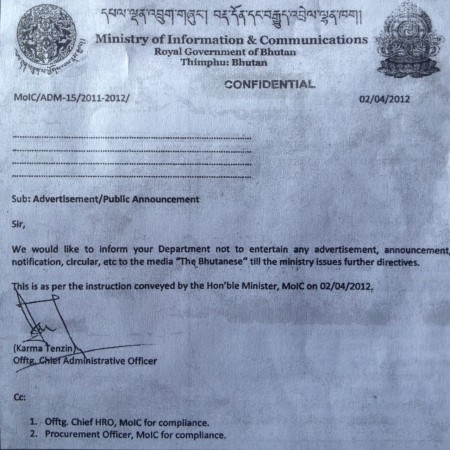Bhutan killing private media
The latest reports from Bhutan have clearly indicated that the current government is in the way to demoralise and kill the budding media industry.
The government has targeted specially the private media, who are critical of the activities of the government and ruling party leaders. The opposition party, almost non-existent in the political front, is rarely criticised by the media. Rather, OL Tshering Tobgay joins hand with the private media to vomit ire against the government.
In a new revelation, Information Ministry, with orders from the minister Nandalal Rai, had issued a secret circular to the ministry departments to stop any kind of advertisement to ‘The Bhutanese’ bi-weekly in April this year. Though recently revealed, the letter was circulated well before the Finance Minister issued orders to the government departments to reduce advertisement expenditure as part of the government’s cost-cutting measures.
In June, the Minister of Finance ordered all government agencies and departments to reduce the expenditure on advertisements.

In addition, the circular of the information ministry mentions to put blanket ban on issuing any advertisement to The Bhutanese. If clarification by Rai is to be believed, he meant Bhutanese media not, The Bhutanese in particular. However, there has never been any circular from the finance ministry to ban all advertisements to media.
The date of issue and the way letter is marked ‘confidential’ dragged the government into larger controversy whether it is sincere towards promoting democratic values and open public debates on issues of public importance.
Addressing the graduates, PM Jigmi Thinley tried to defend his position and come clean of all allegations, it is almost beyond his control now to do so. It is the result of his inability to embrace criticism being a leader of democratic institution.
The Bhutanese bi-weekly has been very critical of the government, specially the top leaders of the ruling party. The paper exposed their involvement in several corruption and nepotism cases including the Trowa theatre, Gyelpozhing and Denchi land scam and the state lottery. After these exposures, The Bhutanese newspaper has been the target of the government.
The government initiated cost-cutting measure citing INR shortage in recent months, after private media objected the earlier proposal that government would provide advertisement to most public-reachable media. Private media opposed this proposal because they cannot compete with Bhutan Broadcasting Service (BBS) (TV and Radio) and Kuensel newspaper, who already receive government subsidy.
After long debates, government and the private media had agreed that basis for providing government advertisement would be circulation (50%) and content (50%). Latest decision by the Election Commission of Bhutan, evidently done under immense pressure from the government, violates this understanding between the government and media.
Election Commission of Bhutan has recently published a notification in Kuensel saying henceforth all its advertisements will be published in Kuensel, BBS and Kuzoo FM.
Bhutanese private media were expecting better income during the election time. Bhutan’s second parliamentary election is expected mid next year.
The latest government measures have clearly indicated that it is making all efforts to kill private media in Bhutan. This is not positive symptom of healthy growth of the new democracy.
The government must immediately withdraw its decisions and treat all media equally. The government should help all media houses, irrespective of their nature of ownership and type, to build a vibrant and efficient media for democratic Bhutan.
Private media in Bhutan started only in 2007 and are already struggling to survive because 90% of their source of advertisement is the government.
The government must not take this advantage to sabotage media. In absence of media, democratic system does not function. Media is watchdog of what government does and does not. They should be given freedom to do their duty.
Also listen to this audio version of the interview with MOIC secretary Kinley Dorji with BBS TV’s show The Panel on 17 August 2012 regarding latest government attack on media.